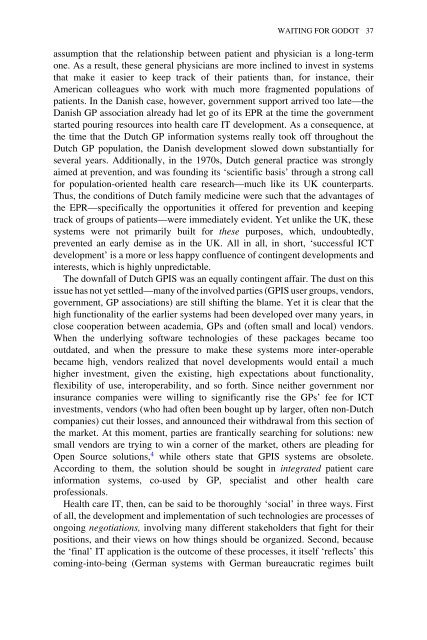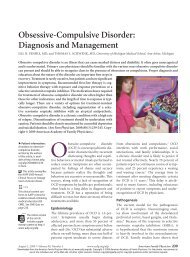Health Information Management: Integrating Information Technology ...
Health Information Management: Integrating Information Technology ...
Health Information Management: Integrating Information Technology ...
Create successful ePaper yourself
Turn your PDF publications into a flip-book with our unique Google optimized e-Paper software.
WAITING FOR GODOT 37<br />
assumption that the relationship between patient and physician is a long-term<br />
one. As a result, these general physicians are more inclined to invest in systems<br />
that make it easier to keep track of their patients than, for instance, their<br />
American colleagues who work with much more fragmented populations of<br />
patients. In the Danish case, however, government support arrived too late—the<br />
Danish GP association already had let go of its EPR at the time the government<br />
started pouring resources into health care IT development. As a consequence, at<br />
the time that the Dutch GP information systems really took off throughout the<br />
Dutch GP population, the Danish development slowed down substantially for<br />
several years. Additionally, in the 1970s, Dutch general practice was strongly<br />
aimed at prevention, and was founding its ‘scientific basis’ through a strong call<br />
for population-oriented health care research—much like its UK counterparts.<br />
Thus, the conditions of Dutch family medicine were such that the advantages of<br />
the EPR—specifically the opportunities it offered for prevention and keeping<br />
track of groups of patients—were immediately evident. Yet unlike the UK, these<br />
systems were not primarily built for these purposes, which, undoubtedly,<br />
prevented an early demise as in the UK. All in all, in short, ‘successful ICT<br />
development’ is a more or less happy confluence of contingent developments and<br />
interests, which is highly unpredictable.<br />
The downfall of Dutch GPIS was an equally contingent affair. The dust on this<br />
issue has not yet settled—many of the involved parties (GPIS user groups, vendors,<br />
government, GP associations) are still shifting the blame. Yet it is clear that the<br />
high functionality of the earlier systems had been developed over many years, in<br />
close cooperation between academia, GPs and (often small and local) vendors.<br />
When the underlying software technologies of these packages became too<br />
outdated, and when the pressure to make these systems more inter-operable<br />
became high, vendors realized that novel developments would entail a much<br />
higher investment, given the existing, high expectations about functionality,<br />
flexibility of use, interoperability, and so forth. Since neither government nor<br />
insurance companies were willing to significantly rise the GPs’ fee for ICT<br />
investments, vendors (who had often been bought up by larger, often non-Dutch<br />
companies) cut their losses, and announced their withdrawal from this section of<br />
the market. At this moment, parties are frantically searching for solutions: new<br />
small vendors are trying to win a corner of the market, others are pleading for<br />
Open Source solutions, 4 while others state that GPIS systems are obsolete.<br />
According to them, the solution should be sought in integrated patient care<br />
information systems, co-used by GP, specialist and other health care<br />
professionals.<br />
<strong>Health</strong> care IT, then, can be said to be thoroughly ‘social’ in three ways. First<br />
of all, the development and implementation of such technologies are processes of<br />
ongoing negotiations, involving many different stakeholders that fight for their<br />
positions, and their views on how things should be organized. Second, because<br />
the ‘final’ IT application is the outcome of these processes, it itself ‘reflects’ this<br />
coming-into-being (German systems with German bureaucratic regimes built











